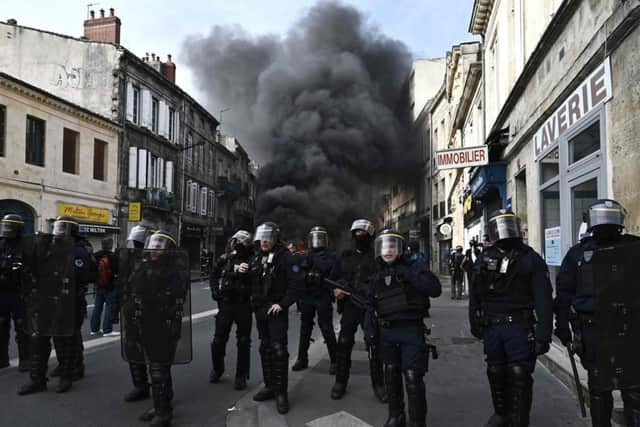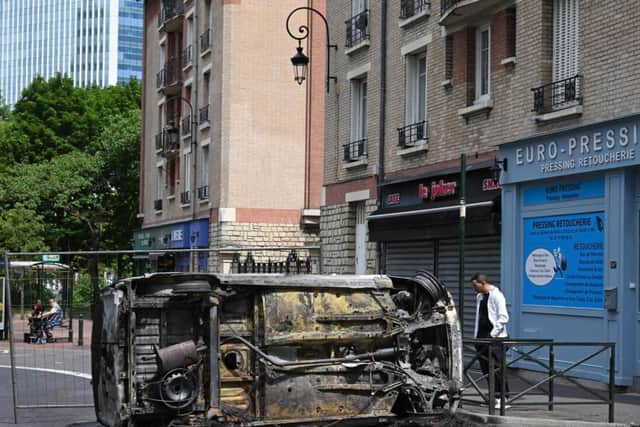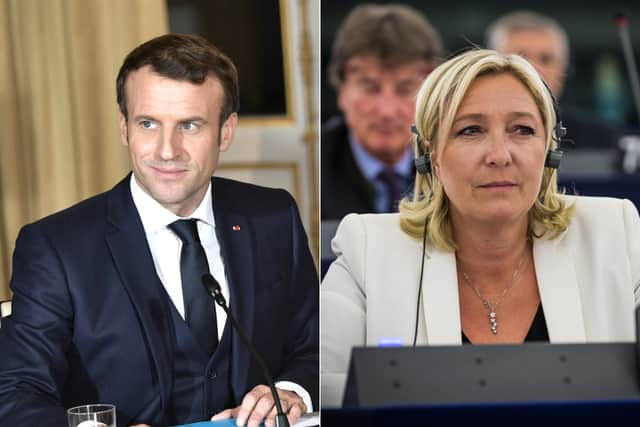France Riots 2023: Why are there riots in France? Where are they? What happens now?
This article contains affiliate links. We may earn a small commission on items purchased through this article, but that does not affect our editorial judgement.
French president, Emmanuel Macron, is facing widespread criticism from politically left and right-leaning voices alike as France endures consecutive nights of rioting following June 27 when 17-year-old Nahel Merzouk was shot by a local policeman.
The country was already plunged into chaos this year after Macron’s bid to enact a pension reform which raises the legal minimum pension age by two years (62 to 64 years old) causing mass protests. Politico reports that to do so he chose “to bypass parliament (vote) and impose his deeply unpopular pensions reform” which in turn “emboldened opposition lawmakers and protesters.”
Advertisement
Hide AdAdvertisement
Hide Ad

Now, a disaffected France is seeing both opposition factions undermine Macron’s presidency after the death of the migrant-background teen, Nahel, who reportedly failed to comply with the officers during a traffic stop. Following almost one week of unrest, France’s Ministry of Interior issued a report to quantify the damage caused.
French newspaper Le Parisien caught wind of this and revealed that “5,662 vehicle fires” and over “1,000 damaged buildings” had been recorded. The night of Friday to Saturday was called “the peak of the unrest” as police arrested over 1,300 people but reports state that up to 3,625 have been apprehended so far.
Initially, Macron responded to the crisis by calling the police action “inexplicable” and “unforgivable” but has also shifted the blame for the ensuing violence on social media platforms. He argued that they were fuelling the riots and his government would work with the sites to remove “the most sensitive content” and identify members who “call for disorder or exacerbate the violence”.
Some have accused the media of ‘downplaying the events’ unfolding in France but it is unclear as to how much Macron’s action with social media providers has resulted in the suppression of details of these events getting out.
Meanwhile, those close to Nahel are mourning his death, in a video on Instagram his mother said: “I have lost a child of 17 years old. They took my baby. He was still a child. He needs his mother.
“This morning, he said: ‘Mum, I love you’. I said: ‘Be careful’.”
Speaking to French news broadcaster BFM TV, his grandmother also expressed her anger towards the officer that shot him but sought to quell the unrest as she said: “Don’t break windows, buses…schools. We want to calm things down.”
However, despite the government deploying tens of thousands of police to manage the situation, reports state that they have ‘struggled’ to contain the violent activity.
Advertisement
Hide AdAdvertisement
Hide Ad

Why is France rioting?
The Economist wrote that the protests “first broke out after a traffic policeman on June 27th shot dead a teenager (Nahel Merzouk) in a rented car who failed to obey orders to stop.” In a video of the incident which circulated online, two officers can be seen at the window of a yellow Mercedes AMG which officials say Nahel was driving ‘erratically’.
In the Paris suburb of Nanterre, one officer pointed a gun through the car’s window and as Nahel attempted to speed off a gunshot can be heard, the car then crashed and the young man died there and then from a bullet wound to the chest. Known locally as Nael M, The New York Times reports that the French-Algerian delivery driver “was an only child being raised by his mother in Nanterre”.
According to Le Monde, the police first testified that the youth had driven towards the officers with the intent of causing harm but this has been widely dismissed as reports state that the viral video undermines that account. That officer has since been detained on homicide charges.


What has the response been to the shooting?
On the political left, leaders have attributed the rioting to government neglect and poverty in “banlieues” which are housing development suburbs of French cities described as multi-ethnic as they have “housed generations of immigrants”. They express that the riots are a “revolt” against policing in France, in particular the use of firearms in traffic stops.
In 2017, French law was changed and allowed officers to use firearms in certain scenarios including “when they are unable to stop a vehicle whose driver has ignored an order to stop and whose occupants are likely to pose a risk to their life or physical safety, or to other people’s.” Last year, a new record of 13 people killed in traffic stops was set and this has been linked to the legislation.
Some protesters argue that the authorities ‘over-police’ the banlieues due to their ethnic backgrounds. Sociologist Fabien Truong told Le Monde that youths say “they get checked for who they are and not for what they are doing”. Many voices, however, have refuted the accusation that the policing is racially driven including the president who denied systemic racism in French law enforcement agencies.
Data-driven analyses are difficult to ascertain since, as the Government confirms: “In France, the collection of ethnicity data is against the law, and is not permitted except under special circumstances.” Regardless, protesters are decrying the French authorities and calling for change in the law that enables officers to shoot during traffic stops.
Meanwhile, on the political right, the Leader of the National Rally, Marine Le Pen, has accused Macron of an irresponsibly ‘lax’ attitude towards immigration, law and order. On Sunday she wrote on Twitter: “In response to the #riots, the government is preparing to once again rain billions of euros on the suburbs. The waste of our taxes must stop, the solution is in the end of immigration, not in renovation or subsidies!”
Advertisement
Hide AdAdvertisement
Hide AdLe Pen, who is set to partake in France’s presidential run in 2027, has called for ‘tougher’ policies such as qualifying youths as adults from 16 years old in criminal proceedings. Those convicted would lose their right to receive welfare benefits or use public housing. Last week, CNN reported that the “average age of the more than 2000 detainees is 17 years old” from the recent riots.
Her appeal seems to be resonating as “an opinion poll conducted on June 30 showed that more people approved of Le Pen’s response to the crisis than any other French politician” according to the Financial Times. Both left and right-leaning voices, however, seem to agree that as with other riots in recent years there is a lot of violence being perpetrated by opportunists or agitators using the chaos to loot, vandalise and create disorder.
The Economist wrote that “most of the arson attacks in recent days have taken place against public services—town halls, libraries, schools, buses” even “in the banlieues themselves”. Vincent Jeanburn, the Mayor of L’Haÿ-les-Roses (a small town five miles from Paris) recently experienced what he called “an assassination attempt” when a car rammed into his home while rioters set his house on fire with his wife and children asleep inside.
He posted on Twitter: “Last night, a milestone was reached in terms of horror and ignominy.”
How much damage have the riots caused?
France has seen thousands of cars set ablaze, countless stores looted and other critical institutions like banks and schools attacked. The country, which is already ‘drowning’ in debt, has been struck by $1.1 billion worth of damage according to Fortune and the economic downturn caused by loss of tourism is expected to be massive.
Reports state that 269 police stations and gendarmeries (France’s “paramilitary”) have been attacked as well as 100 public facilities including 18 town halls, community centres and libraries. French Education Minister Pap Ndiaye said that the damage came to “tens of millions of euros” for the 243 schools that were damaged - 10 of which were partly or totally destroyed.
The Interior Ministry reported that at least 700 security force members have been injured since the riots started. One firefighter, Dorian Damelincourt, “died outside Paris trying to douse vehicles set ablaze during riots” according to The National News. All of this, amid other reports of riot-related deaths and the attack on the French Mayor’s home, led Police Chief Eric Vergne to declare the situation a “war”.
In a statement to Sky News, he said: “People talk about riots, but for those of us who have to deal with all this, it’s not riots - it’s war.
Advertisement
Hide AdAdvertisement
Hide Ad“The people who are standing in front of us are there to kill us.
“They have Molotov cocktails, they have cobbles, they come to within three metres in front of us.
“They have enormous paving stones that they throw at us to try to kill us. They don’t want to play with us. They are there to kill us.”
Where are the riots in France?
Paris, the capital city of France, has seen the bulk of rioting particularly in its surrounding suburbs like Nanterre where Nahel was shot by the officer. The Independent reported: “The clashes between police and protesters spread across the country throughout the week.
“The national police have reported fires or skirmishes in multiple cities, from Toulouse in the south to Lille in the north, though the nexus of tensions was Nanterre and other Paris suburbs.”
In Lille’s Mons-en-Barœul suburb, the town hall was broken into and fires were started. The Foreign, Commonwealth and Development Office said that “It is more important than ever to get travel insurance and check it provides sufficient cover” if you’re visiting France.
What happens now?
Jennifer Cambla, the lawyer representing Nahel’s family, called the police officer’s actions an “execution”. This has led to calls from politicians demanding an ‘overhaul of the police force’. The MP for Nanterre, Sabrina Sebaihi, said: “You don’t need to be an expert to see that what happened was a flagrant disregard for human life. We have to act now.
“This means tackling the use of police in general in this country and especially the use of deadly force."
Advertisement
Hide AdAdvertisement
Hide AdThis has been echoed by activists accusing France of police brutality and racism. However, police presence has been made necessary as the country struggles to contain the violence on public streets. On June 29, the president held a crisis meeting following which the government deployed tens of thousands of officers and attempted to employ a “graduated” use of law enforcement.
In France’s second-largest city Marseille - where rioters were seen stealing hunting rifles from a gun store - authorities banned public demonstrations on Friday, encouraged restaurants to close shop early and declared they would cut public transport by 7pm.
All of this has reminded citizens of the actions of then-president Jacques Chirac who declared a state of emergency in 2005 after riots spread across France for weeks following the death of two youths electrocuted in a power substation as they fled from law enforcement. Despite facing calls to do the same Macron has not done so, but should the violence continue it seems a likely outcome.
While the policeman who shot Nahel is under formal investigation for “voluntary homicide”, criminal activities have persisted and disenfranchised citizens are criticising the government’s ability to handle it. Rather than bring on police overhaul, this may add weight to the campaigns of politicians like Le Pen who push ‘tight’ law-and-order which citizens seek amid the chaos.
The French news outlet CNews released a poll on June 30 that revealed “70% of French people are in favour of sending the army to restore order in the neighbourhoods affected by the riots.”
